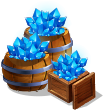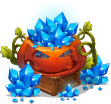Vol.4, Ch.2, P.2
Dita was taken away. Her jarl father, for his part, trembled in contrition.
“Herr Rolf, Alban—forgive me…!” he cried. “Mine own daughter I could not dictate. Now, all is fray’d… by whose failure but mine…!” A mournful concession, one throttled out of his throat like sap from a stone. There Dušan stood, head bent low, teeth clenched tight. At his sides were his fists, curled shut and quaking with shame. “Dita… Dita deserves discipline,” he rasped on. “Strong… strong discipline…! This I make my solemn duty…! As jarl…! As…!”
The olden warrior then wept. Every facet of his fearsome face frowned like crumpled paper as he struggled to still his own sobbing spasms. Having failed to perceive his daughter’s pain till it brimmed and brought about this ill turn was a crushing weight upon his fatherly heart.
“There’s no need,” I assured him. “Lo, I am unharmed, Jarl. Your daughter needs no discipline—not one as strong as you say, at least.”
“A warm wind your words are, Herr Rolf,” Dušan returned. And there, his voice vaulted, “But wintry is the truth! A blade, bared against another clan—the beckoning of bloodshed! Such be Dita’s sin! And too-heavy it hangs!”
Mortifying were his words as they hammered my ears. “What bloodshed, Jarl?” I questioned him. “Not one red drop was drawn. The Edelfräulein’s hands are unstained yet.”
“Pray sheathe your mercy, Herr Rolf!” Dušan cried again. “Ill execution makes ill excuse!”
Yet ill more evil would spring from Dita’s doom—malcontents, say, coming full out of the woodwork to make known their grudge against the Man now amongst them. And in that chaos, perhaps not even the just heart of her father could escape uninflamed by the old fury.
Nay. Such a circle must needs be severed. Forgiving one another, too, ought be a fight worth fighting.
With that thought, I turned to Alban. “Sire,” I said, “I don’t suppose we Vílungen should seek recompense from this matter?”
“We seek none,” he swiftly answered. “All is well if the alliance stands.”
Had Alban lived a different fate, likely here would he have worn more tightly the mantle of jarl and sought out of this situation some debt from Dušan. Only, he, too, was father to a daughter, and so doubtlessly saw much of himself in his Gorkungen counterpart. Indeed, though the two afore me may be proud jarlar, it is when they each turn for the day and sit under star and moon that the quiet world remembers them as they truly are: widowers.
“You’ve heard my Sire, Jarl Dušan,” I said. “At the last, what you decide for the Edelfräulein I cannot counsel for or against. But what I can speak to is this: a sentence upon your daughter brings darkness to us all—and the future we share.”
“B… but…!” Dušan objected.
“The mantle of jarl ill-meets the moment,” I insisted softly. “Might you hang it a while? And be for your daughter whom she needs most right now?”
“…Ah!”
It was then that words were dammed at Dušan’s lips. Any soul could perceive in him a father with much care and concern for his daughter. Still, he had an office to fulfil, and fulfil it he did, almost to a fault. As leader to a people, this was most expected of him. Yet fatherhood ought be no less an office—not when weeping in the dark was his own daughter.
“Though perhaps I presume overmuch,” I admitted to the fraught father afore me. “After all, I’ve yet sired no child of my own.”
“Herr… Herr Rolf…” Dušan stammered as he murmured, overwhelmed.
“My good Dušan,” said Alban. “Rolf speaks true. Heed him, I say, and go—be with Dita.”
“…Much trouble I have churn’d,” Dušan relented at last. “Forgive me… and thank you…! Both of you…!”
The Gorkungen jarl then bowed his head. Were it my way, his daughter would be spared her doom. A wish wanting too much, perhaps. Yet at the end of the day, no evil blunts our blades nor misleads our march more wantonly than the hate in our hearts. If victory in battle did we so desire, then such a vice must we master.
∵
“Well? What’s become of her, then? This ‘Dita’?” asked Lise as we began walking up a dusty stairway.
“Discharged, most like,” I answered behind her. “Can’t blame them, really. Though they’re just as like to let her off with her life.”
“Is that so,” Lise remarked rather uncaringly. “A glad turn.”
Come to think of it, Lise’s ever shown little in the way of malice towards me, for her part. In fact, I daresay she’s never done. Not that I thought her heart empty of her own misgivings or other things best left hid.
How one wrestles with emotion. How one expresses it. Truly does such differ between us all.
“And a doomed deed besides. She ought’ve brought a bigger blade if she meant to unmake my Rolf,” Lise seemed to gloat.
“Nay, a dagger undoes me just fine, I should think…” I corrected her, clueless as to what could’ve inspired so reckless a reckoning. Whatever does this girl think me to be, I wonder?
“Lo—here we are,” she said as we emerged into a higher storey.
“Oh?” There did wonderment steal away my breath. “Now, this…”
…was a sight to behold.
Sprawling afore me now was a bounty of books. Shelf after high-looming shelf, stuffed full with texts and tomes and scripts and scrolls. Bedighting their every cover were patinas of gentle tarnish, telltales of their wisdom having weathered a great many winters.
“A bookworm, for true,” Lise chuckled at me. “Your eyes are aglitter, Rolf!”
Today was I allowed a visit to the archives of Hensen, hungry as I was for the lore of this land. The Jarl Dušan and our other Gorkungen guests were to stay in this fólkheimr for a longer while yet, their next business being the ironing-out of particulars with the high echelons of the Vílungen military. Belonging to the latter, Lise and I were sure to be engrossed in further errands soon; if ever was there a time to stick our noses into books, today was surely it.
My eyes wandered this way and that, down the columns and across the rows. Books of a number beyond imagining; the musty perfume of paper and leather, fond and long-familiar since my springtide days—what a gladness, for all of this to have eluded the Fiefguard’s flames.
“My thanks, Lise,” I whispered, still in awe, “and sorry, as well, for the trouble.”
“What trouble? I like it here, too, well enough,” returned Lise. “Ah—these,” she said, her hand then drifting through a low row before removing a book. “Mm… memories.” Her eyes of emerald traced the faded letters on the cover. It looked to be a work concerning the draconic myths—not exactly the sort of fare preferred by the common lass, but for Lise, it seemed a favourite.
“Eclectic, are we?” I remarked.
Lise smiled. “What? You dream much of dragons yourself!”
“Indeed, I do,” I nodded, feeling then a fire welling up within. “And no profitless pursuit it is, dragon-dreaming. Their awe and eminence, their might and majesty as remembered in numberless legends—who wouldn’t be fascinated? Ah, though there be scholars who gainsay their past existence, sure. But I say they’re mistaken. After all, let’s not forget the many gaping gash-marks scarring the meadows and mountainsides of the land. Those are the smoking embers, if I were to guess. Why, the marks should attest the two famed dragons themselves. Svensson would agree, for certain. You’ve heard of the name, at least, no? Professor Benedikt Svensson, renowned naturalist and researcher of dragons. Indeed you might like his works, Lise, if any fondly you fancy dragons. His Dracarium, especially. In it, he connects the foresaid marks to episodes sung of in the dragon tales of ancientry.”
“Ah… I-I see,” said Lise.
“Speaking of, they hail from days more olden than the Holy Yesteryore—that is, the Tívafornár, as it’s known to your folk,” my lips ran on. “Some even say dragons walked the land when it was yet lifeless, though that theory has its own share of shunners, mind you. Too high a flight of fancy, they say. But in those fancies lies a kernel most convincing: that dragons are the watchers of the world. Which, if true, then—”
“S-say!” Lise yelped. “H-how about this, Rolf?”
There, she thrust upon me the book that had been in her hand. Though much more remained that I should like to opine upon, I took the text anyway and flipped through its pages.
“Hmm… a detailed study, this. Namely, on the tales of the dreklýðir—the dragonlings,” I noted with growing interest.
Many myths abound of J̌yfæ, the dragon of kindling, one of which tells of his begetting a child with a daughter of Man. Such a myth has survived through the ages to present day in myriad forms, from a romance between maiden and dragon, to the ensuing adventures of their very child—all of which were penned by the quill of fiction, of course. But binding them all is the thread that is J̌yfæ’s child-bearing; a thread with a feel more of fact than fiction. And what was in my hands but a book on that very subject—a scholarly discourse, to be exact.
“Quite academic, this,” I remarked. “Have you long liked this sort of literature?”
“Nay. Tales are more my taste,” answered Lise. “But the topic of J̌yfæ’s child… it’s ever struck a chord with me, curious enough. And so I’ve read ‘round of it much.”
An offspring of Man and dragon… If such a soul exists, I would very much like to meet the myth face-to-face—and see if any scales yet grow on that skin.
“Mayhaps you’re the child himself, Rolf?” Lise mused.
“Me?” I said, somewhat taken aback. “Rolf the dragonling? The tallest of tales, that. What’s inspired the thought?”
“Your feats. What else?” Lise returned. “You seem a living legend, Rolf. Fey in more ways than one. And what’s more, you wield the unwieldable.”
The “unwieldable”—girt right here at my hip. A sword attested in the draconic myths themselves. Allowed as I was to bear and brandish it, I could not deny feeling through it a faint connection with dragons. But that should hardly mean my veins bore any of their blood.
“I’d say I’m a tithe too green to be so grey a legend,” I quipped.
“For true, now?” Lise questioned. “They say dragon-youth age till a certain year, and remain as they are for ever on.”
“Nay, I know my childhood, and not a day of it was spent in ancientry, I assure you,” I insisted. “Besides, I’m little more than twenty winters old.”
What’s more, emblazoned in the black sword was more a memory of Gweil’ǫrr, elder dragon and the very nemesis to J̌yfæ. Only the queerest jest would fancy a child wielding a weapon of his father’s foe.
Disappointment passed over Lise’s face. “Mmm, pity. Though you could well-pass for thirty—or forty, even. In especial that mind of yours, Rolf. So grave as a greybeard’s ‘tis.”
Alas, Lise. Pout as you please, this Man is no more than a mere mortal.
───────── ∵ ─────────











Comment (0)